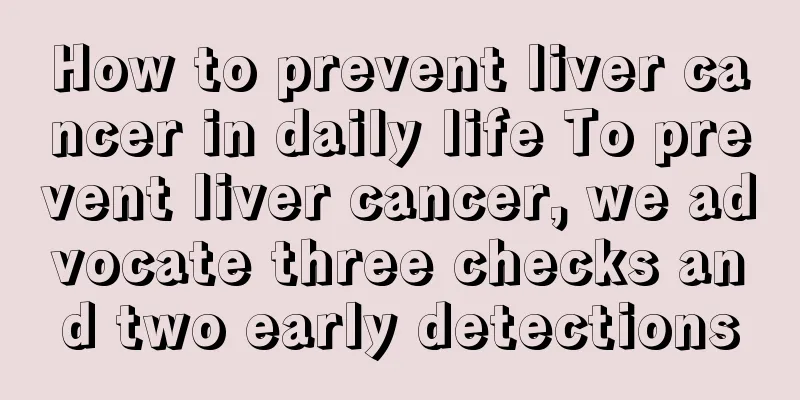How to prevent liver cancer in daily life To prevent liver cancer, we advocate three checks and two early detections

|
About 110,000 people die of liver cancer in my country each year, accounting for 45% of the world's liver cancer deaths. The long-term effect of early resection of liver cancer in the subclinical stage can be particularly significant, thanks to the monitoring of high-risk groups by serum alpha-fetoprotein (AFp) detection combined with ultrasound imaging. In addition, active comprehensive treatment has significantly improved the five-year survival rate of liver cancer. Therefore, for the prevention of liver cancer, we advocate three checks and two early detection. The three checks refer to the three-level census management. According to the risk level of liver cancer, people prone to liver cancer are generally divided into three categories: the first category is the high-risk group, such as patients who develop cirrhosis due to chronic viral hepatitis (hepatitis B or hepatitis C). The second category is the moderate-risk group, such as patients with chronic viral hepatitis, but without a family history of cirrhosis and liver cancer. The third category is the low-risk group, such as patients with non-viral causes of cirrhosis. The three-level census is to conduct different examinations according to the three groups of people. Generally, high-risk groups undergo relevant examinations (liver function, alpha-fetoprotein and ultrasound) every 3 months, moderate-risk groups undergo examinations at least once every six months, and low-risk groups undergo relevant examinations once a year. When suspicious cases are found, CT, magnetic resonance imaging or arterial angiography should be further performed until liver cancer is ruled out. Two early means early prevention and early diagnosis. Clinical practice has shown that the treatment effects of small liver cancer with a diameter of less than 3 cm and middle and late stage liver cancer are completely different. Middle and late stage liver cancer is often accompanied by metastasis inside and outside the liver, which cannot be surgically removed, and interventional embolization and drug treatment are difficult to be effective. However, surgical resection, embolization, ablation and other treatment methods are all good for small liver cancer diagnosed early. Early prevention is to avoid the spread of hepatitis, avoid alcohol, drugs, etc. from causing damage to the liver, and prevent or alleviate the progression of liver fibrosis to the greatest extent. |
>>: What foods can prevent liver cancer? Six dietary principles to prevent liver cancer
Recommend
How to get rid of hair smell
If your hair has an odor, you must wash your hair...
Will my hair become dull if I don't wash it for a few days?
Some people wash their hair every day. If they do...
Can ginger essential oil promote hair growth?
Ginger essential oil is a health product extracte...
Traditional Chinese medicine treatment for diarrhea after colon cancer surgery
Mr. Zhang is a 58-year-old retired cadre. One yea...
Can water chestnuts be eaten with pork?
Water chestnut is a relatively rare ingredient, m...
Will mid-stage uterine cancer kill you?
Patients with uterine cancer should not have a de...
Why is there still blood after a full month of normal delivery
In ancient times, due to the underdeveloped medic...
Grapes soaked in salt water
Grapes are a fruit with a high content of anthocy...
What are the treatment principles of ovarian cancer surgery
The mortality rate of ovarian cancer ranks first ...
What is the average life expectancy of children with small cell lung cancer
Small cell lung cancer in children has an acute o...
Total bilirubin 27
Total bilirubin is a very important indicator for...
How do sports students lose weight
If a person has special athletic talents, he or s...
What are the tips for preserving pine nuts?
Pine nuts are small and exquisite, and they smell...
Why can't quick-drying clothes be worn often
Quick-drying clothes can be worn during normal ex...
How long does it take to soak lobsters in salt water?
When cleaning aquatic products, everyone must be ...









